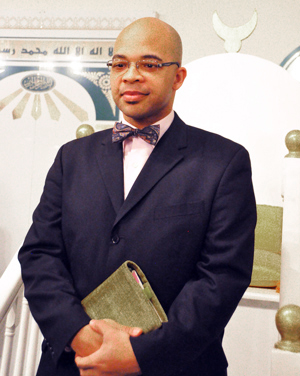by Sultan Rahman Muhammad | @ImamSultanM | Guest Columnist
According to calculations, the lunar Month of Ramadan will begin on the night of April 12 and the first day of the fast begins April 13 before dawn (Fajr Prayer) until sundown. Observers of the fast abstain from food, drink and relations with their husbands or wives during daylight hours for approximately 30 consecutive days.
As we enter the Holy Month of Ramadan, the world of religion collectively engaged in the most sacred holidays of Judaism, Christianity, and Islam—Passover, Easter, and Ramadan. Yet, if each religion had not failed humanity the true principles behind the ritual practices of these great faiths of freedom, justice and equality, would be the order of life.
Allah (God) Reveals in Chapter 2 Verse 185 of the Holy Qur’an: “The month of Ramadan is that in which the Qur’an was revealed, a guidance to men and clear proofs of the guidance and the Criterion. So whoever of you is present in the month, he shall fast therein.”

Before dawn we begin the fast with plenty of water or juice—or light nourishment to be sure we are well hydrated throughout the day. This light nourishment, which marks our intention to fast each morning is called Suhoor, an Arabic word meaning “of the dawn.” We fast from dark to dark and complete each day of the fast with prayer after sunset (Maghrib) followed by a meal. This time is known as Iftar, meaning to break fast.
Ramadan is a month in which Muslims celebrate the Revelation of The Holy Qur’an through daily readings, heightened prayer, acts of kindness and charity. The Month culminates, in its last 10 days through observation of the Night of Power or Majesty (Laila-tul-Qadr). Ramadan is a month of celebration in which children receive gifts, families and community fellowship.
The Holy Month ends with a communal feast called “Id-Al-Fitr,” the Festival of Renewal or Breaking of Fast. Feeding the poor is required prior to attending the morning prayer and feast as an active reminder of the principle of Freedom, Justice and Equality the spirit of the month encourages.
The Honorable Elijah Muhammad writes, if you take the prescribed fast of Ramadan, “you are doing the right thing, until this evil world has vanished” on page 57 and 58 of “How to Eat to Live: Book 2”. Fasting during the Holy Month of Ramadan is an act of individual sacrifice and restraint in commemoration of the Revelation of the Holy Qur’an. Muslims around the world welcome the annual fast as a time of heightened devotion, self-analysis and self-correction, as we seek Allah’s (God’s) Mercy, Forgiveness and Salvation.
The Month of Ramadan is prescribed by Allah (God) as a prescription to build our ability to guard against the evils of the Satanic influences of the world and carnal desires of the “self” through the nurture of God-centered regard in every moment and aspect of our lives.
The practice of self-restraint or stillness through the act of fasting (sawm) is a principle action of Muslims practiced throughout the year to rid “self” of the impurities of mind, spirit and body. Fasting is uniquely designed to burn away the impediments of ego, excess, and self-destructive hungers that hinder human and community growth.
The Honorable Minister Louis Farrakhan teaches, “Fasting, one of the main pillars of Islam, is a principle that must be practiced by every believing Muslim. In fact, fasting has been enjoined in every age, by every prophet that has come to reform the conduct of man.” The Honorable Elijah Muhammad gives beautiful guidance in these words, “during this month, let there be no quarreling or disputing in our homes or abroad.” And, “In this month of fasting we shall keep our minds and hearts clean.”
Ramadan is a means for the Believer to deepen our discipline and purify our character. Prophet Muhammad (Peace and Blessing of Allah Be Upon Him) has instructed, “many get nothing out of the fast except hunger and thirst,” suggesting that there is no true reward or benefit in the fast for the one that is engaged in gossip, slander, idle talk, and other activities that are of sport and play, which take away from the remembrance of Allah (God), Most High. Muhammad (PBUH) is also reported to have said, “Fasting is a shield. During the fast do not use obscenity, nor yell at others, nor act ignorantly towards them. However, if anyone abuses you verbally or attempts to draw you to fight with him, say ‘I am fasting.’ …”
Minister Farrakhan teaches us in “Self-Improvement: Basis for Community Development Study Guides,” “Since fasting is given to us as a prescription—and a prescription is given to us by a doctor, telling us to take a certain medicine at and for a specified time, to effect a cure for a certain illness—in this case, Almighty God Allah is The Doctor prescribing for all of humanity. And now we are speaking specifically to the Black people of America, that fasting is to be used as a cure for a sick spiritual, moral, social and physical condition.
Whenever the human being lacks discipline, the society reflects that lack of discipline in the manifestation of excesses: Excessive eating, excessive drinking, excessive sex, the lust for material things, the greed for power, the overpowering of our intelligence by anger and envy. All of these excesses break the spirit of brotherhood and destroy human society.”
The Month of Ramadan is not designed to be a hardship but a means by which we can reach the goal of a self-less, God-centered regard for everything we engage rather than a self-centered and selfish tendency to succumb to vain urges to heedlessly feed our hungers.
Minister Farrakhan writes, “Practically every evil comes out of a hunger that we desire to satisfy. Since, we cannot discipline that hunger, we exceed the limits. Fasting, therefore, is prescribed.”
The Month of Ramadan should produce a collective spirit among the Muslim community, through the intentional practice of self-restraint and mindfulness of purpose to commit ourselves wholly to the universal cause of the rise of humanity.
Allah (God) has Revealed in verse 90 of Chapter 16 of the Holy Qur’an, “Surely Allah enjoins justice and the doing of good (to others) and the giving to the kindred, and He forbids indecency and evil and rebellion. He admonishes you that you may be mindful.”
(Sultan Rahman Muhammad serves as the Student National Imam of the Nation of Islam and resident Imam of Mosque Maryam National Center, Chicago. Visit NOI.org/ramadan, follow @ImamSultanM on Twitter, or email: [email protected].)













